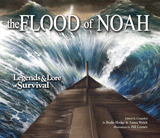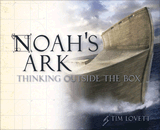Was Genesis Copied from Mesopotamian Flood Myths?
Skeptics suggest the biblical flood was gleaned from the Epic of Gilgamesh etc., but there are critical differences between Genesis and ancient pagan literature.
Skeptics of the Bible’s history often point to the Flood myths of Mesopotamia as evidence that the Bible’s authors simply appropriated stories from the wider culture for their own community. The three main texts discussed in this context are the Atrahasis poem, the Eridu Genesis, and the Epic of Gilgamesh. The first two were written at around the same time (c. 1600 BC), and Gilgamesh was written later (c. 1200–1100 BC). For comparison, Genesis was written around 1400 BC.
These poems are discussed alongside the flood narrative of Genesis because there are some superficial similarities. All feature a man who is saved from a flood by constructing an ark-like vessel. Animals are also taken on board, and birds are released. After some duration, the vessel settles and the hero disembarks.
Genesis: A Divinely Inspired and Well-Preserved Account
But a more thorough analysis shows that there are critical differences between these texts and the Genesis flood narrative and how they were perceived by their culture in contrast to how Genesis functioned in the ancient Hebrew community.
Genesis was viewed as history but also a divinely inspired account of events. This meant that scribes were mainly concerned with transmitting the text faithfully with little to no embellishment. Indeed, the best textual evidence indicates a very stable text that did not change in any significant way.
The historical account also has a moral dimension that is entirely absent from the Mesopotamian myths. While the Genesis narrative emphasizes the growing wickedness of mankind which polluted the whole world, the mythical floods were instigated for trivial reasons, such as humans being too noisy or for no reason at all. While in Genesis God “regrets” that he created mankind because of their increasing wickedness, the gods of the myths regret sending the flood—not because of the senseless havoc they wreaked, but because they were dependent on mankind for their food offerings! This is obviously in stark contrast to the Genesis narrative.
Genesis is also distinct in that it has a sober, meticulous style that focuses on names, dates, and locations, all of which mark it out as history.
Genesis is also distinct in that it has a sober, meticulous style that focuses on names, dates, and locations, all of which mark it out as history. The myths emphasize the more colorful aspects of the flood: the noise, the terror, and the excitement. The goal of the myths is to entertain the hearers of the poems, in contrast to Genesis, which preserves a faithful historical record with the relevant moral dimension of the judgment.
The poems not only differ from Genesis but from each other. This tells us that in Mesopotamia, there was no “canonical” version of the flood myth; rather it was an oral tradition that could be embellished or edited for the purposes of the particular author.
Was Genesis Influenced by the Flood Myths?
Some scholars argue, nevertheless, that Genesis was composed over a long period of time by different groups of editors from the ninth to fifth centuries BC. This is called the “documentary hypothesis.” This would put the composition of Genesis late enough to be influenced by these Flood myths, which did not yet exist during the time of Moses. However, the documentary hypothesis does not take into account the many lines of evidence that Genesis has an earlier composition. Deuteronomy 31:24 states that Moses wrote the words of the law “from beginning to end.”
Also, archaeological evidence has demonstrated that whoever wrote Genesis was very familiar with the culture of the era and places it depicts, namely that
the names of the patriarchs were typical names of the early second millennium, that the migrations and semi-nomadic life-style of the patriarchs also fitted this period, and that many of the legal rites and family customs mentioned in Genesis (e.g. giving dowries) were also attested in old non-biblical texts.1
All of these elements changed between the time of the patriarchs and the time of the exile in Babylon. A later group of editors could not have accurately depicted a culture so far removed from themselves. Instead, Genesis was written early, and the text was preserved by careful copyists who transmitted the text reliably.
The care with which the text of Genesis was preserved also contrasts with the way Mesopotamian authors freely added to or changed the flood poems. For instance, the final version of the Standard Babylonian Epic of Gilgamesh was fixed by a scribe around 1200 BC. He used material from existing sources but also added his own distinctive flourishes, and he added a version of the Flood story copied in some places almost word-for-word from Atrahasis. This scribe changed Gilgamesh so much from the earlier versions that later Babylonians named him as the author!2
The other versions of flood myths in Mesopotamia were edited with similar lack of concern for preserving an original form. Rather the political, social, or entertainment goals of the moment controlled the form the poem took. This is not how writers behave with material they believe to be divinely inspired.
However, the popularity of flood stories both in this area and beyond points to a cultural memory of the historical flood, though important details of the story were lost or changed as the culture became polytheistic and forgot about the true God.
However, the popularity of flood stories both in this area and beyond points to a cultural memory of the historical flood, though important details of the story were lost or changed as the culture became polytheistic and forgot about the true God. While by the time of the Babylonians and Assyrians, the way they treated the poem indicated that they thought of it as less than history. The origins of these poems was probably a dramatic retelling of what the population knew at the time to be a historical event. We find a biblical parallel in Exodus 15, which is a retelling of the parting of the Red Sea recorded in Exodus 14. Since the poem was composed by people who experienced the event directly after it happened, it is clearly historical, even though it contains heightened poetic language.
Genesis Is Uniquely Historical
In most cultures, preserved poetry precedes preserved history. But it is the opposite with Hebrew writings—the historical writings pre-date the poetic books. God inspired Moses to record the early history of the world in Genesis in ways that preserve names, dates, and locations with such accuracy that they are even helpful to archaeological investigations today.
So we should not be surprised that the flood account God inspired in Genesis was preserved by Hebrew scribes with a concern for accuracy that is not shared by the Babylonian scribes who freely adapted their flood myth poems to suit whatever purpose they had at a particular time. Rather, when we take a careful look at the evidence, we can be even more sure that God has given us a true historical record of the early history of the world!
Further Reading
Footnotes
- Gordon J. Wenham, “The Pentateuch” in New Bible Commentary, ed. D. A. Carson, R. T. France, J. A. Motyer, and G. J. Wenham (Leicester, UK: Inter-Varsity Press, 2004), 49.
- Andrew George, “Shattered Tablets and Tangled Threads: Editing Gilgamesh, Then and Now,” Armenian Journal of Near Eastern Studies 3, no. 1 (2008): 11.
Recommended Resources

Answers in Genesis is an apologetics ministry, dedicated to helping Christians defend their faith and proclaim the good news of Jesus Christ.
- Customer Service 800.778.3390
- © 2024 Answers in Genesis








